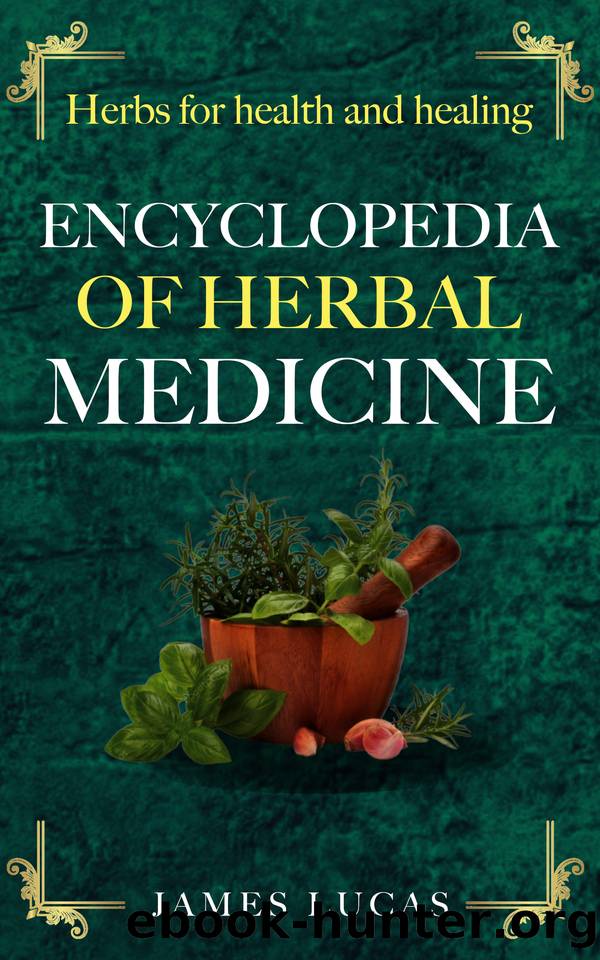Herbal Medicine Book, Encyclopedia of Herbal Medicine: Medicinal Plants and Herbs book by Lucas James

Author:Lucas, James [Lucas, James]
Language: eng
Format: epub, azw3
Published: 2021-09-30T16:00:00+00:00
Horseradish is a root vegetable that grows as a biennial herb. It is a member of the mustard family and has been used as both food and medicine. Although horseradish contains healthful nutrients, consuming too much can cause adverse reactions.
Uses:
Horseradish can be used to treat bronchitis, asthma, hay fever, and pneumonia. Recent studies have shown that a chemical in horseradish known as allyl isothiocyanate may be effective in the treatment of prostate cancer.
Horseradish can also be used to treat sinus infections, stomach upsets, rheumatism, and gout.
Benefits:
Horseradish is a natural antibiotic. Itâs also a natural expectorant and decongestant. Some people use horseradish to treat respiratory problems such as bronchitis, asthma, hay fever, and pneumonia.
Horseradish is high in vitamin C and also contains vitamins A, B-complex, and E.
Origin:
Native to Eurasia and North Africa. Horseradish is cultivated throughout the world.
Side effects:
The root may irritate the skin if handled improperly. Eating large amounts of horseradish may irritate the stomach and intestines, causing nausea and vomiting. Horseradish can cause an allergic reaction in those who are sensitive to the mustard family, which includes cabbage, cauliflower, and Brussels sprouts.
Interactions:
None
Dosage:
A typical dose of horseradish is 1 teaspoon (5 ml) twice daily. The tincture may be used, but only with dosing instructions from a qualified practitioner.
Cautions:
Pregnant women should avoid eating horseradish because it may induce uterine contractions. Horseradish can irritate the stomach when eaten in large amounts. It can also irritate the skin. Always wash your hands thoroughly after handling horseradish root to avoid irritating your skin. People with heartburn or stomach ulcers should discuss using horseradish with their doctor.
Hyssop
Description:
Hyssop is a plant with sturdy, tall stems and spires of bluish-green leaves. It has tiny, pale purple flowers that grow in clusters at the tops of stems. The leaves have a minty scent and a sharp, bitter taste.
Uses:
This herb is used to treat bronchitis, coughs, and throat infections. It is also applied topically to soothe skin conditions such as wounds, eczema, and psoriasis. A tea made from hyssop can be used to treat loss of appetite, vomiting, diarrhea, fever, and infections of the mouth.
Download
Herbal Medicine Book, Encyclopedia of Herbal Medicine: Medicinal Plants and Herbs book by Lucas James.azw3
This site does not store any files on its server. We only index and link to content provided by other sites. Please contact the content providers to delete copyright contents if any and email us, we'll remove relevant links or contents immediately.
Inner Engineering: A Yogi's Guide to Joy by Sadhguru(5897)
The Power of Now: A Guide to Spiritual Enlightenment by Eckhart Tolle(4755)
Fear by Osho(4085)
The Art of Happiness by The Dalai Lama(3384)
The Ultimate Bodybuilding Cookbook by Kendall Lou Schmidt(3320)
Yoga Therapy by Mark Stephens(3222)
Ikigai by Héctor García & Francesc Miralles(3141)
The Little Book of Hygge by Meik Wiking(3081)
Why Buddhism is True by Robert Wright(2826)
The Healing Self by Deepak Chopra(2796)
Being Aware of Being Aware by Rupert Spira(2706)
Shift into Freedom by Loch Kelly(2692)
Wild Words from Wild Women by Stephens Autumn(2589)
Work Clean by Dan Charnas(2562)
Happiness by Matthieu Ricard(2524)
The Hatha Yoga Pradipika (Translated) by Svatmarama(2482)
Yoga Body & Mind Handbook by Jasmine Tarkeshi(2464)
More Language of Letting Go: 366 New Daily Meditations by Melody Beattie(2444)
Why I Am Not a Feminist by Jessa Crispin(2239)
